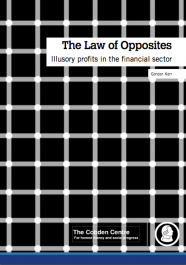
As I prepared an article on how banks generate illusory profits and artificial levels of capital by gaming the rules, I rediscovered this limerick in Gordon Kerr’s related paper, The Law of Opposites:
There was a young man from Darjeeling
Who got on a bus marked “To Ealing”
The sign on the door
Said “Don’t spit on the Floor”
So he lay back and spat on the ceiling
Here’s a great metaphor from the book, which explains how the rules banks use might affect a business in the real economy:
Tabitha works on the shop floor of a Debenhams perfume counter. Her contract with Debenhams provides that she earns 10% of Debenhams’ profit. So if the cost price of the average bottle of perfume is £25 per bottle, it is sold for £75, and Tabitha sells 50 bottles each week, Debenhams would earn £2500 and pay Tabitha £250.
Imagine that mark-to-market accounting is introduced, and the Finance Director explains the new rules to Tabitha. He explains that there is a new way of recording profits, one no longer based on bottles sold but on the market price of her perfume and the number of bottles in stock.
Being a bright woman, Tabitha realizes that this is an easier and more profitable way to do business. All she has to do is buy as many bottles as possible, refuse to sell any and wait for the price to increase on account of her withholding supply.
So, that week Tabitha buys 600 bottles from wholesalers and calls her competitors at Selfridges and other department stores in order to ensure that there is no perfume available for sale.
Then a young man comes in desperate for a bottle for his girlfriend. Tabitha sends him to a small chemist whom she says is the only supplier in town. The chemist charges the young man not £75 but £115 and agrees to confirm to Debenhams’ accountants that he sold a bottle for £115. £115 is therefore now the market price.
Under the new IFRS accounting rules Tabitha can now look at her total pool of unsold stock, 600 bottles, and mark them to market. Debenhams now makes a profit of £90 per bottle on 600 bottles = £54,000. The store’s managers are delighted; they too earn large bonuses. Tabitha’s 10% arrangement entitles her to a bonus of £5,400 rather than £250.
Best I finish that article but, in the meantime, please see the related campaign page.